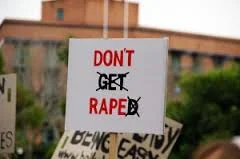Our tendency to conceive of sexualized violence as a clearly defined set of criminal charges further distorts our relationship with its underlying cultural causes. Sexual assault is a physical manifestation of a series of beliefs that have been culturally and socially constructed and accepted. Addressing cases of sexual assault and harassment is certainly challenging enough, but limiting the scope to these extreme demonstrations of entitlement is ultimately a disservice. We need to move beyond the ‘convenient’ lens of a stranger in the bushes and come to terms with the full complexity of the only violent crime in Canada that is not declining.
We cannot afford to shy away from this conversation, no matter how uncomfortable it may be. In assembling this issue, there have certainly been moments where we felt uncomfortable, whether by sharing personal experiences, learning something new, or by trying to deconstruct concepts such as hook-up culture, revictimization, “tradition” – the list goes on. These are hard questions to ask, and even harder questions to answer.
But rather than dismissing these matters due to a lack of clarity, we need to make a concerted effort to unpack the plurality of ways in which sexualized violence is reinforced in our society - through our legal systems, socialization, gender binaries, pop culture, heteronormativity, etc. – and address them directly.
When sexualized violence is so often made to be invisible, the first task at hand is to bring these elements to the fore, call them what they are, and make them visible. This is the central focus of our issue. We do not have all the answers, but we are intimately aware of the need to have these hard conversations.
We acknowledge the important work the university has done this year in establishing StFX’s first sexual violence policy, as well as the developments made by the Bringing in the Bystander program. Yet as the administration has done well to admit, the policy is only a first step. We still have a long way to go in shifting the narrative from one that normalizes and silences experiences of sexualized violence to one that does not tolerate the exploitation or violation of another person’s bodily integrity.
Our world is one where being sexually assaulted is either widely ignored or is considered shameful, where the victim/survivor is made to feel as though they did something wrong in being violated. How victim/survivors are made to feel is the foundation of the culture surrounding sexualized violence, and it is only once we fully address this fundamentally twisted stigma that we can start dismantling the remaining toxic mentalities that pervade our society.
The response to acts of sexualized violence must transition from shame and indifference to outrage, and this outrage must in turn be harnessed into action. While broad social change over time is ultimately required, it starts with speaking truth to power and being vigilant in rendering sexualized violence truly unacceptable through action as well as words.






